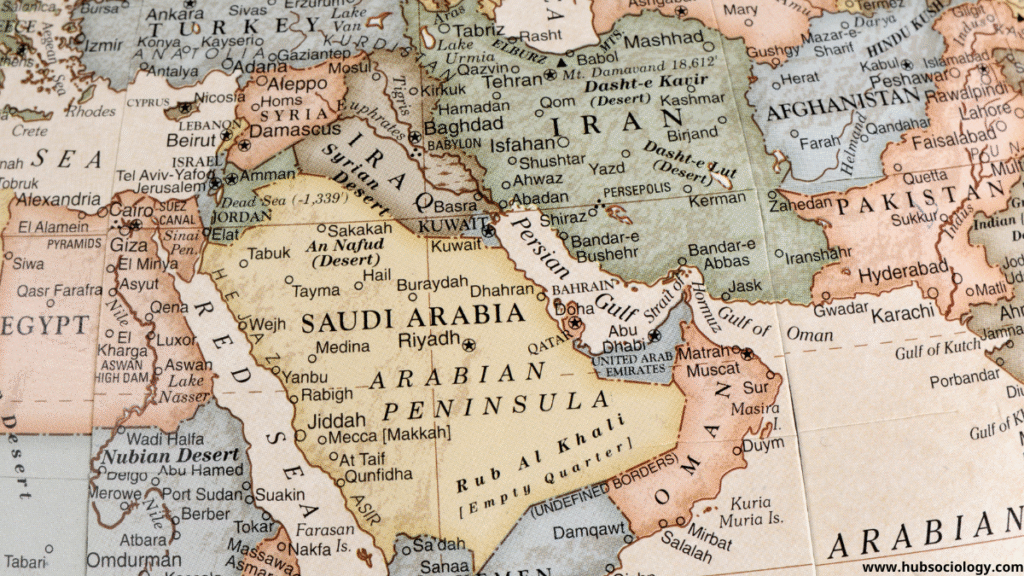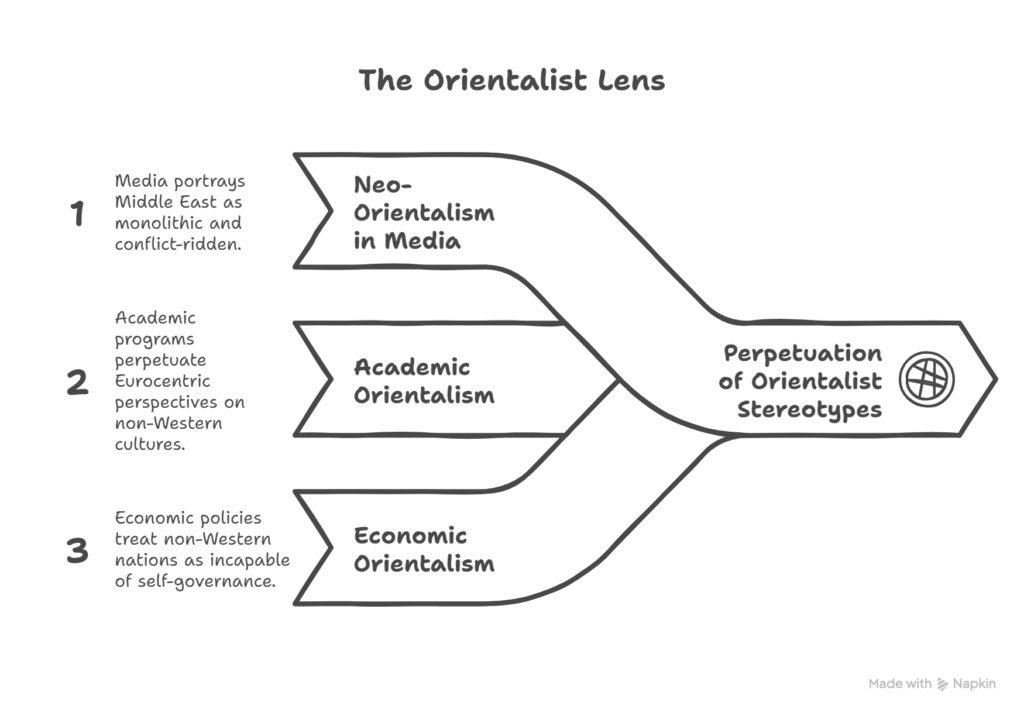Introduction
Edward Said’s Orientalism (1978) is one of the most influential works in postcolonial studies, cultural criticism, and sociology. The book examines how Western scholarship, literature, and political discourse have constructed a distorted and stereotypical image of the “Orient”—primarily the Middle East, Asia, and North Africa. Said argues that Orientalism is not just an academic discipline but a system of thought that reinforces Western dominance over the East. From a sociological perspective, Orientalism provides a critical framework for understanding how knowledge, power, and cultural representation intersect to sustain colonialism and imperialism.
This article explores Said’s concept of Orientalism, its sociological implications, and its relevance in contemporary discourse. It examines how Orientalism functions as a form of cultural hegemony, how it shapes identity and otherness, and its impact on postcolonial societies.

1. Orientalism as a System of Knowledge and Power
Said’s Orientalism draws heavily from Michel Foucault’s theory of discourse and power, which posits that knowledge is not neutral but is shaped by power relations. Orientalism, in Said’s view, is a Western discourse that produces and controls knowledge about the East. This discourse is not merely descriptive but prescriptive—it defines how the Orient should be understood and governed.
Key Sociological Themes in Orientalism:
- Power-Knowledge Nexus: Orientalist scholarship was not just about studying the East but about controlling it. European colonial powers used academic research, travel writings, and political reports to justify their domination.
- Binary Oppositions: Said highlights how Orientalism constructs a rigid dichotomy between the West (rational, civilized, progressive) and the Orient (irrational, exotic, backward). This binary reinforces Western superiority.
- Institutionalization of Orientalism: Universities, museums, and media perpetuate Orientalist stereotypes, making them appear as objective truths rather than constructed representations.
From a sociological standpoint, Orientalism demonstrates how dominant groups use cultural representations to legitimize their authority, a concept aligned with Antonio Gramsci’s theory of cultural hegemony.
2. Orientalism and the Construction of the “Other”
A central sociological concern in Orientalism is the process of othering—defining non-Western societies as fundamentally different and inferior. Said argues that the West defines itself in opposition to the Orient, reinforcing its self-image as superior.
Mechanisms of Othering:
- Exoticization: The Orient is portrayed as mysterious, sensual, and decadent (e.g., harem fantasies in European art).
- Infantilization: Eastern societies are depicted as immature, requiring Western guidance (e.g., colonial “civilizing mission”).
- Demonization: The Orient is often associated with despotism, fanaticism, and violence (e.g., stereotypes of “Islamic terrorism”).
This othering process has real-world consequences, influencing foreign policy, immigration laws, and racial discrimination. Sociologists like Stuart Hall and Frantz Fanon have similarly explored how colonial ideologies shape racial and cultural hierarchies.
3. Orientalism and Colonial Legacies
Said’s work is deeply connected to the sociology of colonialism and postcolonialism. Orientalism did not disappear with the end of formal colonialism but evolved into new forms of domination.
Postcolonial Continuities:
- Neo-Orientalism in Media: Hollywood films and news outlets often depict the Middle East as a monolithic, conflict-ridden space, ignoring its diversity.
- Academic Orientalism: Area studies programs sometimes reproduce Eurocentric perspectives rather than engaging with indigenous knowledge systems.
- Economic Orientalism: Global economic policies (e.g., IMF structural adjustments) treat non-Western nations as incapable of self-governance.

Sociologists such as Immanuel Wallerstein (world-systems theory) and Gayatri Spivak (subaltern studies) have expanded on Said’s ideas, showing how economic and cultural imperialism persist today.
4. Criticisms and Debates
While Orientalism has been groundbreaking, it has also faced critiques from various sociological perspectives:
Major Criticisms:
- Overgeneralization: Some argue that Said homogenizes both “the West” and “the Orient,” ignoring internal diversities.
- Neglect of Resistance: Said focuses on Western discourse but pays less attention to how colonized peoples resisted Orientalist representations.
- Limited Scope: The book primarily deals with the Middle East; its applicability to other regions (e.g., East Asia, Africa) is debated.
Despite these critiques, Orientalism remains a foundational text for understanding the sociology of knowledge, imperialism, and cultural representation.
5. Orientalism in Contemporary Society
Said’s framework remains relevant in analyzing modern issues:
Case Studies:
- Islamophobia: Post-9/11, Western media and politicians have reinforced Orientalist tropes, portraying Muslims as inherently violent.
- Migration and Borders: Anti-immigrant rhetoric often depicts non-Western migrants as threats to “Western values.”
- Global Development Discourse: International NGOs sometimes frame non-Western societies as “backward,” justifying paternalistic interventions.
Sociologists today use Said’s ideas to critique digital Orientalism—how algorithms and social media perpetuate stereotypes about the East.
Conclusion
Edward Said’s Orientalism offers a powerful sociological lens for analyzing how knowledge, culture, and power intersect in shaping global hierarchies. By exposing the mechanisms of Orientalist discourse, Said challenges us to question dominant representations and seek more equitable forms of cross-cultural understanding. In an era of globalization, migration, and persistent inequalities, Orientalism remains an essential tool for sociologists, activists, and scholars committed to decolonizing knowledge and resisting cultural imperialism.

Topic Related Questions
5-Mark Questions (Short Answer)
- Define Orientalism according to Edward Said.
- What is the “Other” in Said’s Orientalism?
- How does Orientalism reinforce binary oppositions?
- Name two institutions that perpetuate Orientalist discourse.
- What is the role of literature in Orientalism?
- How does Said link knowledge and power in Orientalism?
- Give an example of a stereotype perpetuated by Orientalism.
- What is the “civilizing mission” in the context of Orientalism?
- How did colonialism use Orientalist knowledge?
- What is cultural hegemony in relation to Orientalism?
10-Mark Questions (Brief Essay)
- Explain how Edward Said’s Orientalism critiques Western representations of the East.
- Discuss the role of media in sustaining Orientalist stereotypes today.
- How does Said’s concept of Orientalism relate to Foucault’s theory of power-knowledge?
- Analyze the impact of Orientalism on postcolonial identities.
- Compare Orientalism with Gramsci’s idea of cultural hegemony.
- How does Said’s Orientalism challenge traditional academic scholarship?
- Discuss the concept of “exoticization” in Orientalist discourse.
- How has Orientalism influenced Western foreign policy?
- Explain the connection between Orientalism and Islamophobia.
- How do travel writings contribute to Orientalist discourse?
15-Mark Questions (Long Essay)
- Critically examine Edward Said’s Orientalism as a sociological critique of Western dominance.
- “Orientalism is not just about the past but continues to shape contemporary global relations.” Discuss.
- How does Said’s Orientalism help in understanding modern-day media representations of the Middle East?
- Evaluate the strengths and limitations of Said’s Orientalism in postcolonial studies.
- Discuss the relevance of Said’s Orientalism in analyzing neocolonial economic policies.
- How does Orientalism contribute to the construction of national and cultural identities?
- “Orientalism is a tool of cultural imperialism.” Critically analyze this statement.
- Compare Said’s Orientalism with Frantz Fanon’s Black Skin, White Masks in terms of colonial discourse.
- How can Said’s Orientalism be applied to critique contemporary migration and border policies?
- “The West defines itself by defining the East.” Discuss this statement in the context of Said’s Orientalism.
